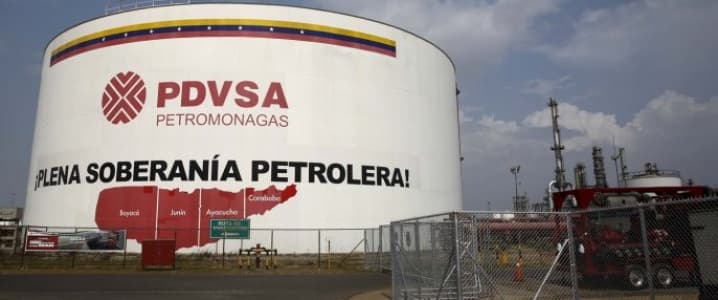A blackout struck a major Venezuelan oil refinery, crippling operations at a time when oil production had appeared to be stabilizing.
It’s been an odd few months for Venezuela, where events have receded from the front pages of major news outlets around the world. The American-backed coup effort by Juan Guaidó has failed, and President Maduro seems entrenched in power, even if the country’s economic, political and humanitarian crisis grinds on.
More recently, however, the one thing that has stabilized is the country’s oil production, although at historically low levels. After plunging in the first two months of 2019, following the introduction of U.S. sanctions, production has largely been stable since March. Venezuela produced 1.15 million barrels per day (mb/d) in January, but spiraled down to just 732,000 bpd in March.
Against the odds, production leveled off and even rebounded slightly, rising to 760,000 bpd in June, according to the latest data from S&P Global Platts. OPEC releases new data later this week, which could offer more clues into the latest production figures.
Guaido’s failed coup coincided with the stabilization of oil production, somewhat relieving pressure on Maduro and tamping down the atmosphere of crisis. Gauidó’s campaign continues and he will look to exploit any possible opening. He recently said that he would not negotiate with Maduro and vowed to increase his confrontation against the government, following an initial round of mostly fruitless negotiations in Oslo. A senior presidential palace official, who spoke privately to Argus Media, described Guaidó’s promise not to negotiate as a “drowning man's last efforts to stay afloat on dry land. Guaidó knows he is losing the people's support and he is desperate, but all he can do make empty promises and toothless threats.” Related: Goldman Sachs: Shale Boom Caps Real Oil Price Gains Until 2020
While that description offers a bit of pro-Maduro spin, the official appears correct in that the fire and urgency from the public has faded as Guaido’s coup fizzled. President Trump appears to have lost interest in Venezuela, even if American sanctions remain firmly in place.
However, that isn’t necessarily the end of the story.
The risks facing Maduro and Venezuela are far from over. For instance, on July 7, a blackout knocked PDVSA’s massive 940,000-bpd CRP refining complex offline, according to Argus Media. The complex includes the Amuay refinery (635,000 bpd) and the Cardon refinery (305,000 bpd). The outage will likely exacerbate the shortage of refined fuels, as well as cripple both import and export operations, according to Argus.
Two officials told Argus that the latest blackout was the result of “a catastrophic failure” of a turbine at an oil-fired power plant. The facility provides electricity to the two refining units. Worse, the blackout may have caused “structural damage” to the refineries because it occurred before the facilities could implement emergency shut down measures, Argus reported.
The CRP refining complex accounts for nearly three-quarters of PDVSA’s refining capacity. The Venezuelan government blamed the blackout on saboteurs, a typical explanation for the Maduro regime.
The fallout from the massive refinery outage is still unclear. But it’s safe to say that it presents yet another threat to Maduro, even though his grip appears to have firmed up as of late. “Blackout in both refineries,” an employee who works in the complex wrote in a text message to Reuters. “It’s going to be difficult to get the system back up.” Related: OPEC: Oil & Gas Are Part Of Solution To Climate Change
The problem for the opposition is that the multiple failed coup attempts may have only consolidated Maduro’s hold on power. Some of the few military elements that came out in favor of toppling Maduro were exposed, and others may be less likely to risk another attempt to oust the leader. Because the U.S. has essentially ruled out a military intervention, and the Trump administration has turned its sights on Iran, Guaido’s side has been left in the lurch. International attention has waned, even as the UN recently accused Maduro’s government of “grave violations of economic, social, civil, political and cultural rights,” including a “shocking” number of extrajudicial killings.
Meanwhile, Maduro’s government appears to be grooming a younger Chavista leader, in the event that the international pressure forces a new election (which, for now, does not appear to be in the cards). Bloomberg reports that Hector Rodriguez, the governor of Miranda state, is a rising star in the Maduro camp and could offer a fresh face to keep the Bolivarian regime going.
By Nick Cunningham of Oilprice.com
More Top Reads From Oilprice.com:
- U.S. Oil Rig Count Falls Amid Rising Production
- Why Natural Gas Prices Collapsed
- Shale Boom Reshuffles Global Top 50 Oil & Gas List


















